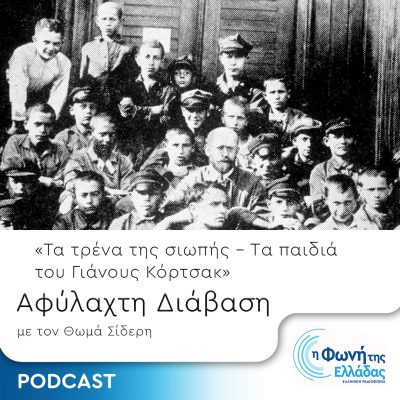Episode 6: The children of Janusz Korczak
The episode is dedicated to the greatest educator of the 20th century, the Polish-Jewish doctor, Janusz Korczak, who was killed in the Treblinka hellhole along with his children from the Warsaw ghetto.
During the documentary, the shocking testimony of the last surviving student of Janusz Korczak is featured, who on the initiative of his teacher was smuggled from Poland and thus escaped deportation to the ghetto, managing to survive the Holocaust. He is the same man who years later depicted on canvas the faces and figures of his teachers, Janusz Korczak and Stefa Wilszenska, as he remembered them during his childhood.
As an educator, Korczak was one of the pioneers, as he very quickly transcended established perceptions and well-established practices and applied in his orphanage absolutely innovative methods and techniques, as well as structures of self-management, e.g. the children’s court to which the teachers were also accountable, as well as Korczak himself sometimes, the children’s parliament, the newspaper, the keeping of diaries, forming rules of everyday life with children and more. For many of them he complements the pedagogy of Célestin Freinet, also a veteran of the Great War, who was active at about the same time in France and was based on similar principles: the principle of respect and concern for children, the need to exercise democracy. At the same time, he touches upon the New Education, which focuses on the child as the center of interest, as he was affected by every humanistic and child-centered approach. In general, it was a time, the beginning of the 20th century, when a new pedagogical concept was emerging, however, its practice was far from the expectations and efforts of the enlightened few.
Assistant Professor at the University of Patras, Nektarios Stellakis, and teacher, Charalampos Baltas, talk about the life, work and pedagogical ideas of Janusz Korczak in the documentary. 90-year-old, multi-award-winning children’s writer, Angeliki Varela, talks about Korczak’s silent march with his children from the ghetto to the killing center, in her last interview shortly before she passed away.
The audio documents of the 1930s aired in the radio documentary were provided by Polish public radio.
14 radio-documentaries about the Holocaust. Oral testimonies and narratives, diaries, handwritten notes. The anthropogeography of the Holocaust, through the traces of space and people.
Research-documentation-presentation: Thomas Sideris – journalist, Ph.D. in Social Geography
Broadcast: Friday 8 December 2023, 13.00-14.00
